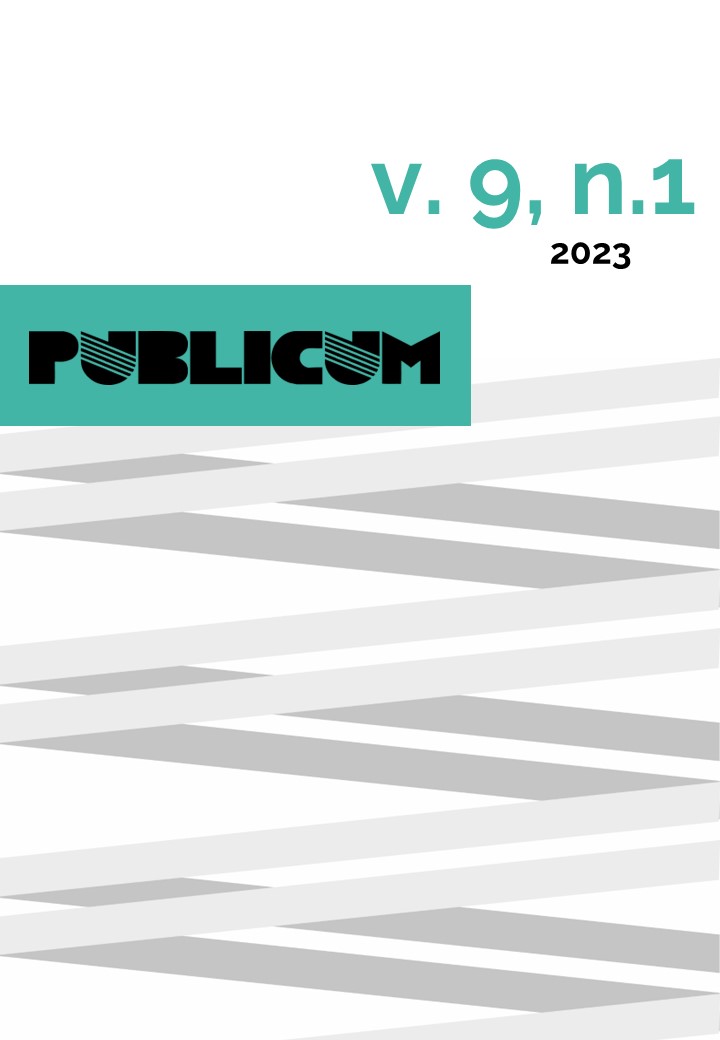Garantia de petição
DOI:
https://doi.org/10.12957/publicum.2023.78345Palavras-chave:
Garantia de petição, Democracia, Participação, Devido procedimento de elaboração normativa, LobbyResumo
Conhecida mais como direito de petição, trata-se propriamente de uma a garantia fundamental de exigir do Estado certa postura. Realiza-se a democracia com a petição, porque há participação de quem não decide na tutela de interesses jurídicos perante as instâncias publicas decisórias. Da garantia de petição, posição jurídica fundamental de caráter instrumental, é que surgem o devido procedimento de elaboração normativa e o lobby, figuras que concretizam a democracia participativa.
Referências
ACQUAVIVA, Marcus Cláudio. Dicionário jurídico Acquaviva. São Paulo: Rideel, 2011.
AMARAL, Francisco. Direito Civil: introdução. 4. ed. Rio de Janeiro: Renovar, 2002.
ARAÚJO, Luiz Alberto David; NUNES JÚNIOR, Vidal Serrano. Curso de Direito Constitucional. 22. ed. São Paulo: Verbatim, 2018.
BARBOSA, Ruy. República: teoria e prática (textos doutrinários sobre direitos humanos e políticos consagrados na primeira Constituição da República). Petrópolis: Vozes, 1978.
BARCELLOS, Ana Paula de. Direitos fundamentais e direito à justificativa: devido procedimento na elaboração normativa. Belo Horizonte: Fórum, 2016.
BARBOSA SOBRINHO, Osório Silva. Direito constitucional de petição: exercício da cidadania. Brasília: ESMPU, 2016.
BERNARDES DE MELLO, Marcos. Teoria do fato jurídico: plano da eficácia. 11. São Paulo: Saraiva, 2019.
BOTTALLO, Eduardo Domingos. Lições de Direito Público. 3. ed. São Paulo: Dialética, 2009.
BULOS, Uadi Lammêgo. Curso de Direito Constitucional. 9. ed. São Paulo: Saraiva, 2015.
CARNELUTTI, Francesco. Teoria Generale del Diritto. 3. ed. Roma: Foro Italiano, 1951.
CHÁVEZ, Xóchitl Alicia Ramírez; RINCÓN, Francisco de Jesús Cepeda; SANMIGUEL, Nancy Nelly González. The right of petition and the typological forms of petition in Mexico’s tax matter. Seqüência Estudos Jurídicos e Políticos, [S.I.], v. 41, n. 85, p. 86-11, 2020. Disponível em: https://periodicos.ufsc.br/index.php/sequencia/article/view/75200. Acesso em 30 dez. 2022.
COSTA, Célio Silva. A interpretação constitucional e os direitos e garantias fundamentais na Constituição de 1988. Rio de Janeiro: Liber Juris, 1992.
DAHL, Robert Alan. Sobre a democracia. Tradução de Beatriz Sidou. Brasília: UnB, 2001.
DALLARI, Dalmo de Abreu. Elementos de Teoria Geral do Estado. 32. ed. São Paulo: Saraiva, 2013.
GRINOVER, Ada Pellegrini. Ensaio sobre a processualidade: fundamentos para uma nova Teoria Geral do Processo. Brasília: Gazeta Jurídica, 2018.
KUHN, Thomas Samuel. A estrutura das revoluções científicas. 8. ed. Tradução de Beatriz Vianna Boeira e Nelson Boeira. São Paulo: Perspectiva, 2003.
LEAL, Victor Nunes. Problemas de técnica legislativa. Revista de Direito Administrativo, Rio de Janeiro, v. 2, n. 1, [S. I.], p. 429-447, 1945. Disponível em: https://bibliotecadigital.fgv.br/ojs/index.php/rda/article/view/8211. Acesso em 12 dez. 2022.
MARTINS, Leandro. Comentários ao art. 5º, XXXIV, a. In CANOTILHO, José Joaquim Gomes; et. al. Comentários à Constituição do Brasil. 2. ed. São Paulo: Saraiva, 2018.
MELLO FILHO, José Celso de. Constituição federal anotada. São Paulo: Saraiva, 1984.
PÁDUA, Felipe Bizinoto Soares de. Um breve histórico dos paradigmas do acesso à justiça. Revista de Direito Público Contemporâneo, Instituto de Estudios Constitucionales da Venezuela e Universidade Federal de Rural do Rio de Janeiro do Brasil, a. 3, v. 1, n. 2, jul.-dez./2019, p. 134-158.
PÁDUA, Felipe Bizinoto Soares de. Vamos falar de direitos fundamentais (Parte I): o que são e sua relação com a democracia. Jornal Estado de Direito, Porto Alegre, publ. em 02 mar. 2020. Disponível em: http://estadodedireito.com.br/vamos-falar-de-direitos-fundamentais-parte-i-o-que-sao-e-sua-relacao-com-a-democracia/. Acesso em 31 dez. 2022.
PAULSEN, Leandro. Curso de Direito Tributário completo. 11. ed. São Paulo: Saraiva, 2020.
PETRILLO, Pier Luigi. Teorias e técnicas do lobbying. Tradução de Antonio Araldo Ferraz Dal Pozzo e Augusto Neves Dal Pozzo. São Paulo: Contracorrente, 2022.
PONTES DE MIRNADA, Francisco Cavalcanti. Os fundamentos actuaes do Direito Constitucional: vol. 1. Rio de Janeiro: Freitas Bastos, 1932.
PONTES DE MIRNADA, Francisco Cavalcanti. Tratado das ações: tomo I. 2. ed. São Paulo: RT, 1972.
ROMANO, Santi. Lo Stato moderno e la sua crisi. Milano: A. Giuffrè, 1969.
ROSENVALD, Nelson. O que é verdadeiramente o dano moral? In ROSENVALD, Nelson. O Direito Civil em movimento: desafios contemporâneos. 3. ed. Salvador: JusPODIVM, 2019.
SCHULZ, Fritz. Princípios do Direito Romano: aulas de Fritz Schulz. Tradução de Josué Modesto Passos. São João da Boa Vista: Filomática Sorocabana, 2020.
SILVA, José Afonso da. Aplicabilidade das normas constitucionais. 2. ed. São Paulo: RT, 1982.
SILVA, José Afonso da. Curso de Direito Constitucional positivo. 24. ed. São Paulo: Malheiros, 2005.
Downloads
Publicado
Como Citar
Edição
Seção
Licença
Copyright (c) 2024 Felipe Bizinoto Soares de Pádua

Este trabalho está licenciado sob uma licença Creative Commons Attribution-NonCommercial 4.0 International License.
O autor do trabalho declara conhecer e concordar com as regras a seguir:
1) Realizou o trabalho apresentado à revista, sendo inteiramente responsável pelas ideias e conceitos nele emitidos, que não correspondem, necessariamente, ao ponto de vista dos Editores de Publicum.
2) Obedeceu, na realização do trabalho, os princípios éticos aludidos na política de avaliação da revista[RDN1] .
3) Assume a autoria e a responsabilidade pela obra, declarando que ela não infringe quaisquer direitos de propriedade intelectual de terceiros.
4) Responsabiliza-se, integralmente, por danos de natureza moral ou patrimonial que a veiculação da obra venha a gerar a terceiros.
5) Cede à revista os direitos de reprodução, edição e primeira publicação do trabalho em qualquer meio midiático, em particular sob forma digital, em arquivo eletrônico online na internet.
6) Confere aos Editores o direito de modificar o texto apresentado, sem prejuízo de seu conteúdo, quando necessário para uniformizar a apresentação dos trabalhos e para atender as normas de edição próprias da revista.
7) Concorda com a forma final do trabalho aprovada pela revista.
8) Autoriza a divulgação do trabalho nos canais de comunicação da Faculdade de Direito da UERJ.
9) Concorda com a reprodução de pequenos trechos do trabalho em outras publicações da UERJ.
10) Reconhece que, pela cessão e autorizações acima referidas, não receberá remuneração sob qualquer modalidade, tendo estas o caráter de colaboração científica.
11) Tem ciência de que a publicação do trabalho poderá ser recusada caso não considerada conveniente, por qualquer motivo que seja, sendo que tal recusa não gera responsabilidade e/ou ônus de espécie alguma à revista ou UERJ.
[RDN1]Ver COPE.

Publicum está licenciado com uma Licença Creative Commons Atribuição-NãoComercial 4.0 Internacional.

